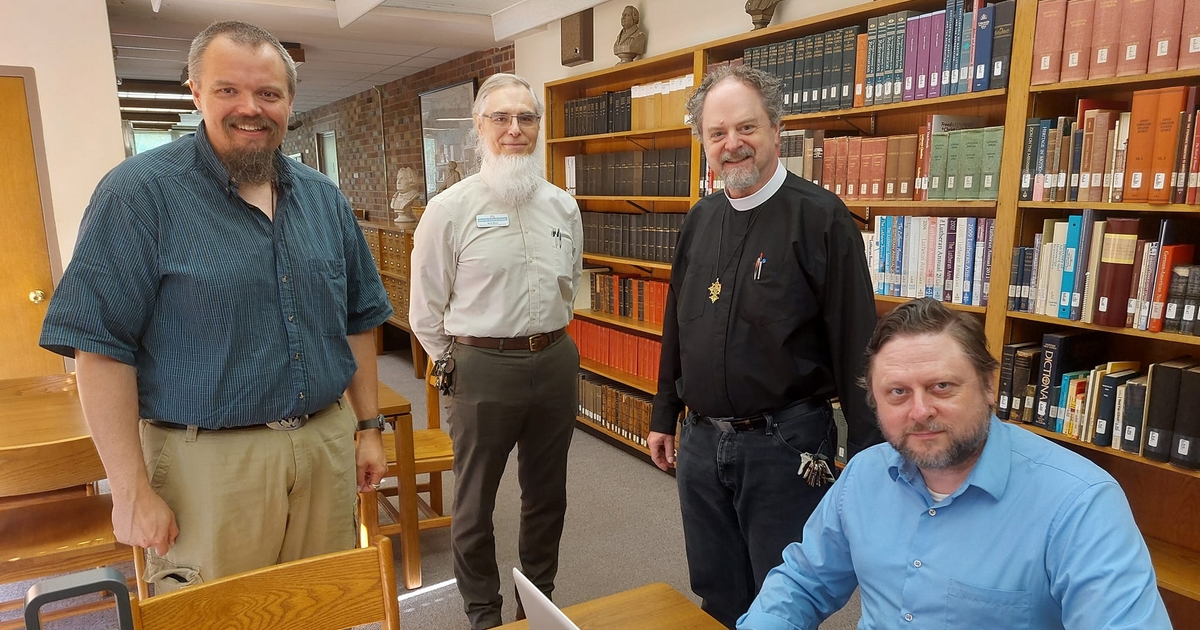This year I have been studying the life and one topic in the teachings of Francis Pieper. His work on that topic and the story of his life are so impressive that I wanted to know more. How could I learn more about him and his work?
It is not so easy.
Rev. Robert E. Smith, the now retired librarian of Concordia Theological Seminary in Fort Wayne, prepared at my request a first edition of a Bibliography of the Works of Franz Pieper, which has been a big help.
For the other formative figure of The Lutheran Church – Missouri Synod, we have resources such as C. F. W. Walther, Churchman and Theologian. One of the great elements of that publication is “The Concordia Historical Institute Waltherana Research Guide” painstakingly developed by Rev. Dr. Thomas Egger. No such resource has yet been developed about Pieper. The Pieper collection at CHI is 17 Linear Feet (Forty 5″ document boxes; five 1″ bound volumes; six card index file boxes).
What to do?
Theodore Graebner says in his “A Biographical Sketch of Dr. Francis Pieper” that Pieper never learned to use a typewriter. Much of the Pieper collection would include handwritten German text. His penmanship was noted by publishers as being very good and they had no complaints about setting type from his handwritten submissions. But I cannot read handwritten German. This was going to require a team.
World renowned translator Matthew Carver was willing to travel to St. Louis to translate materials and help me discover what each item in the collection is about. Rev. Joshua Scheer, Editor-in-Chief of Steadfast Press, was willing join the team to key me into the theological and historical significance of each item.
Having a team of three workers and two overhead-camera archiving scanners would put a bit of a burden upon CHI. And herein lies what makes it all work: the hospitality and expert assistance of Rev. Dr. Daniel Harmelick, Executive Director of CHI, and Mark J. Bliese, Reference and Research Supervisor. These men have the proper calling of archivists: to make collections accessible.
Carver, Scheer, and I submitted a two-tiered set of priorities of what we wanted to examine from the 17 linear feet of Pieper materials. We scheduled a two-day visit to the institute. On our arrival, we were given ample table space. The two tiers of materials had been pulled from the archives and set in our order of priority on a multi-shelved rolling cart which already was positioned next to our table. Harmelick and Bliese gave is a brief orientation to how the archives and cataloging of holdings work, which is so helpful in accelerating the examination of the materials. Both remained available to our inquiries throughout the two days of our visit. We tried to play “stump the reference librarian” but we were unable to accomplish that. They were able to answer everything we wanted to know.
They provided us coffee and other refreshment, even opening to us the sandwich bar for the Board of Governors who were meeting at the institute on our second day.
Hospitality enabled us to make many amazing discoveries about Pieper and his work. It was fascinating to see how he took notes, how he organized material, and how many varied interests he had. We got a lively sense of his industry, humility, and frugality. It became obvious that he was not well off economically, and his notes were taken on a wide variety of cheap, repurposed papers of differing sizes and types. He was from the make-do, use-it-up, and wear-it-out era. Yet it seemed he felt himself living in a sumptuousness of a different king, Christ’s atonement for his sins and the fellowship of family and believers. A couple of highlights for us were his marginal notes in his copy of the Book of Concord and his annotations to Baier’s compendium.
Things went so swimmingly that I had enough time to go across the street Kristine Kay Haase Memorial Library. There were some works that I had identified ahead of time from the online catalog that I was hoping to see. All of them were rare books in protected holdings. Yet again, hospitality met me, this time in the form of Dr. Bruce Durazzi, Special Collections Librarian. He pulled the sources for me and gave me space in a reading room. Again, enough space was provided to use an overhead-camera archiving scanner.
Of course, our team’s Pieper project is not even a drop in the bucket of what the Institute holds. Take a look at the Institute’s website to get an idea of the scale of the collections.
There are several upshots from this visit, mostly tending in the direction that, seriously, the Institute needs greater financial support.
Concordia Historical Institute is important. It connects us with our Christian heritage, and that brightens our prospects. To be cut off from our history would darken our understanding of our lives. The Institute is a vital support to the “ministry of reconciliation” in the sense of that phrase in 2 Corinthians 5:18. Its resources help us as a synod to keep track of what the Gospel is and maintain a clear and faithful teaching of the “word of reconciliation” (2 Corinthians 5:19).
The holdings of the Institute are vast and varied, and much more ought be gathered into them. The facilities were visionary when first built, but much time has passed and now there are significant issues from ordinary deterioration and out-of-date tools. These conditions and some shortness of staff hamper the work of the Institute. From somewhere, a significant influx of finances is needed. Based on what the Institute is for and what it accomplishes, the influx is warranted and comports with good stewardship for our spiritual heritage.
Consider becoming a member of Concordia Historical institute. If you are a person of blessed financial resources, consider making a major contribution to the current capital campaign of the Institute. Call Rev. Dr. Harmelink (314-505-7900) and let him explain the need and the vision.
This article and my appeal to you to support CHI are entirely unsolicited by anyone.




